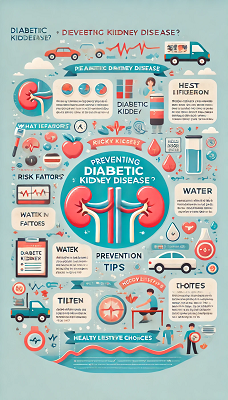Diabetes and kidney disease are two prevalent health conditions that have significant interconnections. The rise in diabetes cases globally has also led to an increase in kidney disease incidents. This article delves into the link between diabetes and kidney disease, exploring the mechanisms behind this relationship, the impact on patients’ lives, preventive measures, and current research developments.
Understanding Diabetes
Diabetes mellitus is a chronic condition characterized by high levels of glucose in the blood due to the body’s inability to produce or properly use insulin. There are two main types: Type 1 diabetes, an autoimmune condition where the pancreas produces little to no insulin, and Type 2 diabetes, which is more common and occurs when the body becomes resistant to insulin or the pancreas does not produce enough insulin.
Understanding Kidney Disease
Chronic kidney disease (CKD) is a long-term condition where the kidneys do not work as well as they should. It progresses over time and can lead to kidney failure, requiring dialysis or a kidney transplant. The kidneys’ main function is to filter waste products and excess fluids from the blood, which are then excreted in urine.
The Mechanism Linking Diabetes to Kidney Disease

The link between diabetes and kidney disease primarily involves the damage high blood glucose levels cause to the kidneys’ filtering system. Here’s a detailed look at how this happens:
- High Blood Sugar Levels: In diabetes, persistent high blood sugar levels damage blood vessels throughout the body, including those in the kidneys.
- Glomerular Damage: The kidneys’ glomeruli, which are tiny filtering units, become damaged. This damage leads to increased permeability, causing essential proteins to be lost in the urine (proteinuria).
- Hypertension: Diabetes often leads to high blood pressure, which further damages the kidneys by increasing the pressure in the glomeruli.
- Inflammation and Scarring: Chronic high blood sugar levels cause inflammation and scarring (fibrosis) in the kidneys, reducing their ability to filter blood efficiently.
Stages of Diabetic Kidney Disease
Diabetic kidney disease (DKD) typically progresses through several stages:
- Hyperfiltration: Early stage where the kidneys filter blood at an increased rate.
- Microalbuminuria: Small amounts of protein (albumin) appear in the urine, a sign of kidney damage.
- Macroalbuminuria: Larger amounts of protein in the urine, indicating more severe kidney damage.
- Decline in Glomerular Filtration Rate (GFR): The rate at which kidneys filter blood decreases.
- End-Stage Renal Disease (ESRD): Kidney function deteriorates to the point of requiring dialysis or a kidney transplant.
Prevalence and Impact
Diabetes is the leading cause of kidney disease. According to the National Kidney Foundation, approximately 30% of patients with Type 1 diabetes and 10-40% of those with Type 2 diabetes will eventually suffer from kidney failure. The impact on patients’ lives is profound, as it leads to increased morbidity, reduced quality of life, and significant healthcare costs.
Prevention and Management
Preventing diabetic kidney disease involves managing diabetes and adopting a healthy lifestyle. Key strategies include:
- Blood Sugar Control: Keeping blood glucose levels within the target range through diet, exercise, and medication.
- Blood Pressure Management: Maintaining blood pressure within the recommended levels using lifestyle changes and medications like ACE inhibitors or ARBs.
- Regular Monitoring: Frequent check-ups to monitor kidney function and detect early signs of damage.
- Healthy Diet: Reducing salt intake, eating a balanced diet rich in fruits and vegetables, and avoiding processed foods.
- Exercise: Regular physical activity to maintain a healthy weight and improve cardiovascular health.
- Smoking Cessation: Avoiding tobacco, which can accelerate kidney damage.
Current Research and Future Directions
Research into the link between diabetes and kidney disease is ongoing, with several promising areas of study:
- Biomarkers: Identifying biomarkers that can detect kidney damage at an earlier stage.
- Genetic Studies: Understanding genetic predispositions to diabetic kidney disease.
- New Medications: Developing drugs that target specific pathways involved in kidney damage, such as SGLT2 inhibitors, which have shown promise in reducing kidney disease progression.
- Artificial Intelligence: Utilizing AI to predict individual risk and tailor preventive strategies.
Living with Diabetic Kidney Disease
Managing diabetic kidney disease requires a multifaceted approach. Patients need to work closely with a healthcare team that includes endocrinologists, nephrologists, dietitians, and primary care physicians. Education about the condition, adherence to treatment plans, and lifestyle modifications are crucial for maintaining kidney function and overall health.
The link between diabetes and kidney disease is a significant concern, given the rising prevalence of diabetes worldwide. Understanding the mechanisms, stages, and preventive measures is essential for managing and mitigating the impact of this relationship. With ongoing research and advances in medical treatments, there is hope for better management and outcomes for patients suffering from both conditions.
References
- National Kidney Foundation. (2021). Diabetes and Kidney Disease (Diabetic Nephropathy). Retrieved from https://www.kidney.org/atoz/content/diabetes
- American Diabetes Association. (2021). Diabetes Complications. Retrieved from https://www.diabetes.org/diabetes/complications
- Centers for Disease Control and Prevention (CDC). (2021). Chronic Kidney Disease in the United States, 2021. Retrieved from https://www.cdc.gov/kidneydisease/publications-resources/CKD-national-facts.html
- Mayo Clinic. (2021). Diabetic nephropathy (kidney disease). Retrieved from https://www.mayoclinic.org/diseases-conditions/diabetic-nephropathy/symptoms-causes/syc-20354556
- Kidney International. (2021). Diabetic Kidney Disease. Retrieved from https://www.kidney-international.org/article/S0085-2538(21)00512-7/fulltext
#Diabetes #KidneyDisease #DiabeticNephropathy #CKD #DiabetesManagement #Health #Wellness #MedicalResearch #Healthcare #ChronicIllness #HealthyLiving







